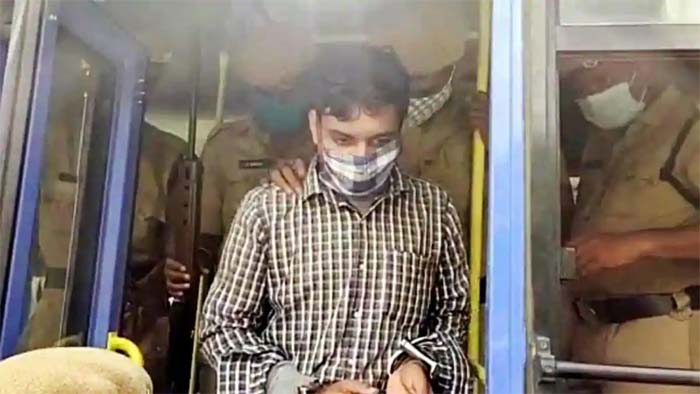- Death warrant to the criminal
- Speed of the trial is an example for others
- Ten persons were killed to his a crime
- Rarest of rare cases of cruelty
If Warangal District Court can complete the trial of a ten-murders case within five months from the date of crime, why the other courts cannot do the same?
Warangal police team lead by ACP Shyam Sundar, Public Prosecutor Mokila Satyanarayana Goud and Additional District & Sessions Judge K. Jayakumar proved that a speedy trial is not that impossible, and a murder trial could be successfully conducted in existing system within reasonable time, if there is no external influence or political interference, despite the Covid-19 issues. ACP G. Shyam Sunder was able to file the charge-sheet within a month. This appreciable success of three wings- police, prosecution, and court – points out failure of justice in lakhs of cases all over the country, and the delay has grown as malignance that infects the justice in the society. Why can’t we complete hearing of serious criminal cases against politicians before they contest elections and destroy the Constitutional governance?
Question of unemployment and migration
The Warangal crime has an economic angle and unemployment issue. The accused is a migrant worker and his victims also were migrants. They stayed back in Warangal during the Covid-19. Unemployment brought them over to remote village of Telangana from far away Bihar and Bengal. The Bihari migrant has wiped out a couple of families of other migrant workers. He killed nine to hide the murder of his illicit woman partner.
Accused is a single man without support or guidance of family. Aloofness is caused by migration which is caused by unemployment. Absence of family cover drives the earning, uneducated young man to evil activities. A criminal is born out of circumstances that administrators create.

The lust-based criminality
The ghastly crime the court considered as rarest of the rare murders, began with the lust of the young migrant Bihari worker who came to Warangal six years ago for livelihood. He used to work in a gunny bag making unit where another worker Maqsood worked and lived with his family. Prosecution collected evidence to show that Sanjay developed relationship with a woman Rafika of West Bengal, also a migrant worker, living close-by. She was a relative of Maqsood’s wife. Rafika used to live with her three children separately. Going deep into the motive of the crime, the police found that Sanjay promised to marry Rafika but never intended really. In addition, his lustful eyes fell on her teenaged daughter. Rafika suspected that Sanjay might have sexually assaulted her daughter and started questioning him. Sanjay took her to Bengal on the pretext that his marriage with her should be approved by the elders. During the March third week he booked train journey and as the train reached Tadepallygudem, police alleged, he administered sleeping pills to her. When she fell unconscious, he threw her from running train and returned to Warangal. Sanjays contradictory answers to Maqsood’s wife, Nisha Alam, made her doubt him and questioned about Rafika’s absence. Nisha Alam knew that Sanjay is cohabiting with Rafika, who had already three children from earlier marriage. Nisha Alam also threatened him with police complaint if he does not reveal truth about Rafika.
The court is convinced with the narrative of prosecution that as he killed Rafika to escape marriage, similarly, killed the other nine persons to erase evidence.
Modu operandi – sleeping pills
Sanjay’s modus operandi again was same – sleeping pills, which he could get in required quantity, and laced with the food prepared for the birthday party of Maqsood’s child. The poisonous food served in the birth day party was consumed by all the family members besides friends such as Shyam, Sriram and Shakeel who lived in the same compound. They all fell unconscious. Sanjay dumped them in a nearby well, that ultimately killed all of them, the PP said.
The PP’s demand for capital punishment to the accused Sanjay Kumar Yadav citing it as the rarest of the rare case, was accepted. This murder reflects the economic crisis prevalent in our country as the accused and all the nine victims were members of migrant workers’ families. They were: Maqsood Alam, 50, his wife Nisha Alam, 45, their sons Shabaz Alam, 21, Sohail Alam, 20, daughter Bushra Alam, 22, Bushra’s three-year-old son, Sriram, 35, Shyam, 40 and Shakeel, 40.
Agreeing with the prosecution, the Judge Jaya Kumar convicted and awarded death sentence to Sanjay Kumar Yadav. Death imposing judgement was told to this Bihari accused in Hindi language through a translator,
Murder case in Railway
“A separate murder case was registered by the Government Railway Police of A.P. against Sanjay for this. The charge-sheet is yet to be filed in this case,” according to Public Prosecutor.
Child Rape case
Sanjay is also facing another criminal case registered by the Warangal police under Section 376 (rape) of the Indian Penal Code and Sections 5 and 6 of the Protection of Children from Sexual Offences (POCSO) Act. This case was filed after investigators found evidence that he had sexually assaulted Rafika’s minor daughter and impregnated her. A charge-sheet was filed and trial in the case is likely to begin soon.
How could he get sleeping pills?
The crucial evidence in the case was finding of sleeping pills in the food and corroborative evidence derived from examination of around 100 witnesses.
Why people are forced to migrate from Bihar, Bengal?
This crime also indicates the precarious situation of economy in our country where the youth are compelled to migrate from Bengal and Bihar to reach distant places like Warangal, 140 kilo meters from Hyderabad. It also shows that regulation over pharma sale is not working as the accused could easily get the sleeping pills, without any prescription of the doctor, in such a quantum that he could administer it to nine persons at once. Sociological and criminological reasons need to be probed for such murders which are facilitated by unregulated governance mechanisms like not bothering about unemployment, migration, and absence of controls by pharmaceutical authorities failing to prevent sale of drugs like sleeping pills. When the circumstances facilitate and regulation does not prevent, the state must act in multipronged way. Punishing the criminal is a must. But the story does not end there, if the state does not perform its duties in making it is difficult to crimes.
Right to speedy trial
Whole country’s criminal investigative and adjudicative system has to take the Warangal trial as an example as task was completed in a remarkable period of five months from the date of crime, i.e., on the night of May 20, 2020, in Gorrekunta village of Geesukonda Mandal in Warangal district. Not only the victims, but the accused also has a right to speedy trial, which is part of guarantee under Article 21 of our Constitution. This trial proves that system can act in required speed and this also raises doubt why the other crimes take years and decades to investigate and prosecute, especially when legislators are accused. The independent functioning of the police in sincere way is the basic need for criminal justice to be established.




